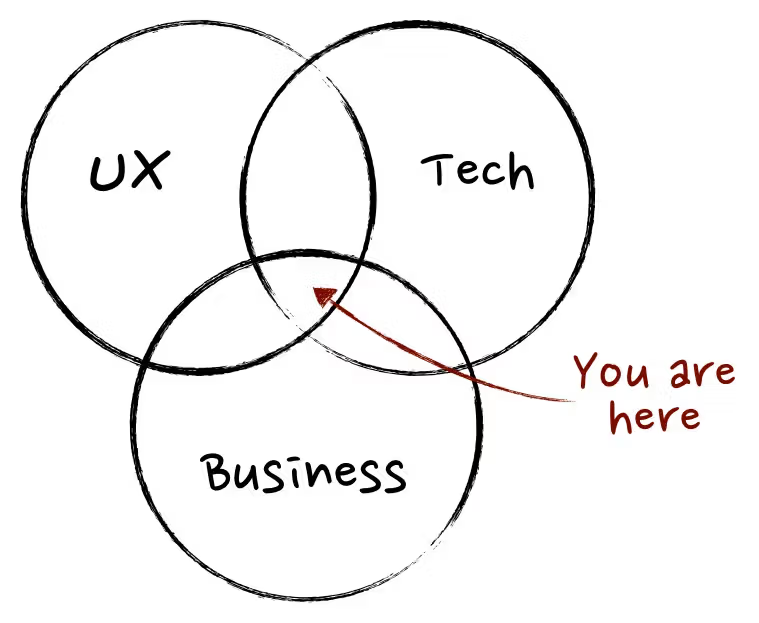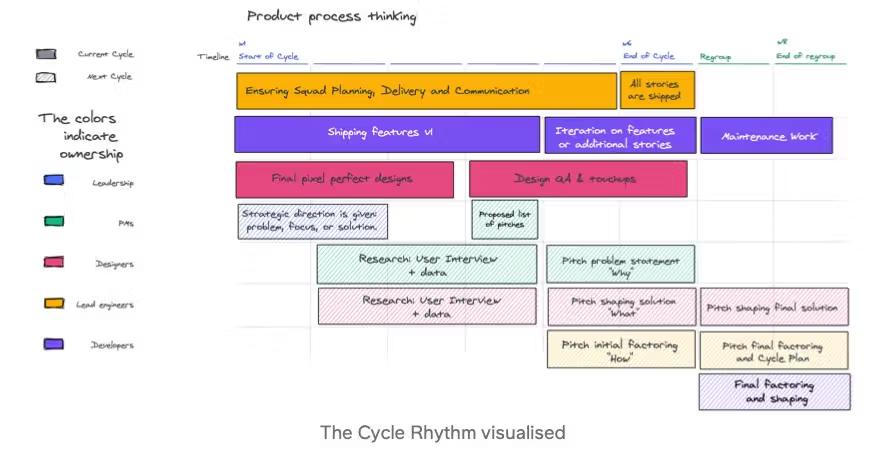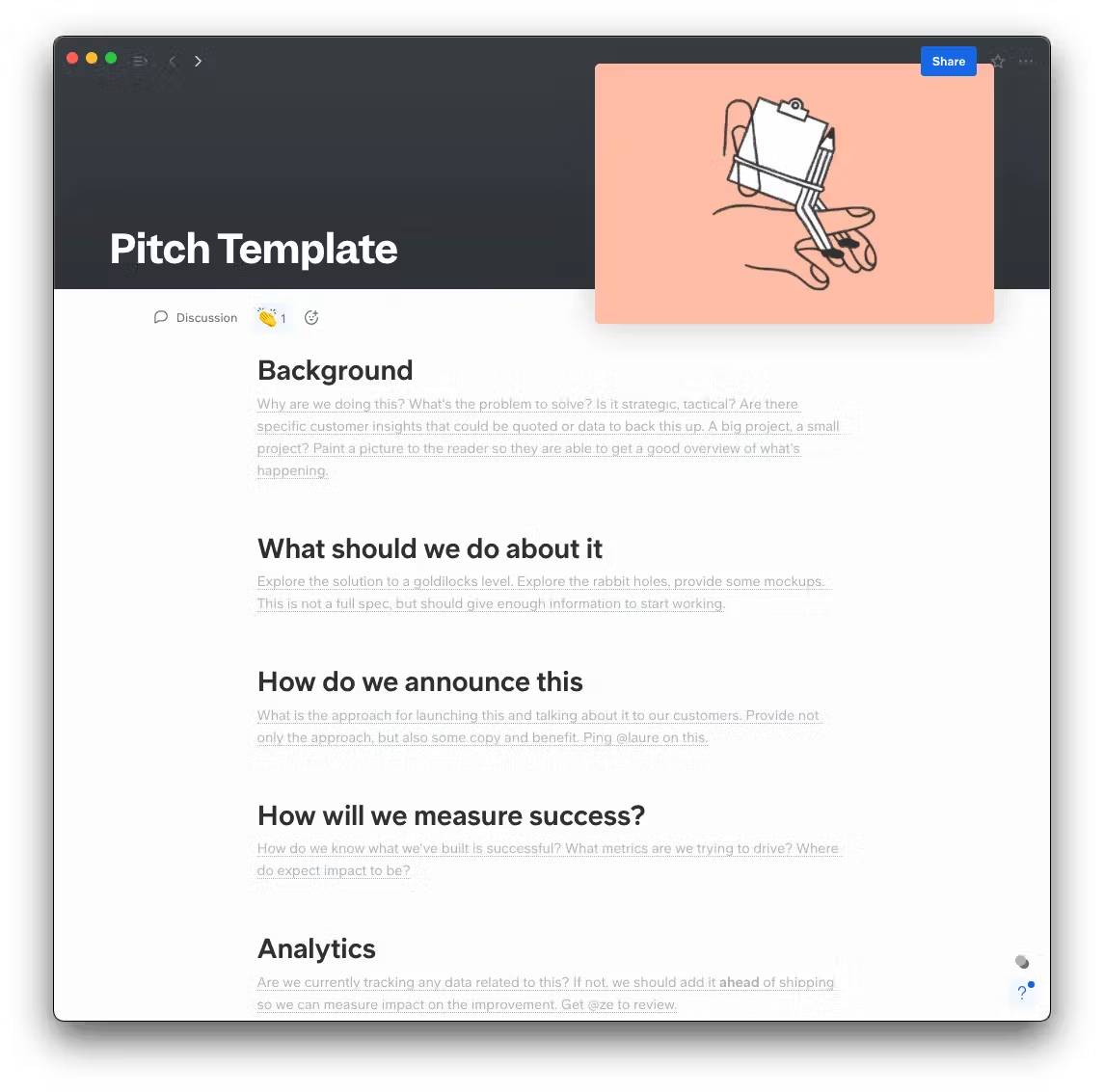Previously thought of as an aspect of marketing or engineering, it's truly come into its own as a discipline and is letting its value shine. Nowadays, some of the biggest names in the world have robust product management departments, including Amazon, Google, and Airbnb.
Because the modern conception of product management is relatively new, there's a lot of confusion surrounding it. That's why we've decided to break the whole discipline down for you in this comprehensive guide. If you've got questions about product management, you've come to the right place.
What is product management?
Product management can refer to a job, a department, a practice, or an industry in itself.

People working in product management are responsible for the entire lifecycle of a specific product within a company. Product management is carried out by a product manager and their product management team. They also work closely with product owners, marketing managers, engineers, senior management, and more.
More specifically, product managers work on things like new product development, business cases, product life cycle, market and customer research, product marketing, product launch, and more. They also provide an essential link between businesses and their customers, and are the glue that keeps many teams working in harmony internally as well.
Here's a real-life example from our own Product Handbook that details our conception of product management.
"Product is a team sport. It's a culmination of work between product management, design, and engineering. It takes input across the company from marketing, the customer team, analytics, leadership, and growth. It aims to continually improve our product to better serve our current and future customers." - Mike, VP Product @Slite
The product management process

Product management has several different stages. Of course, no one thinks of an idea for a product and has it successfully produced, marketed, and distributed the next day. While no product management team will approach their process in exactly the same way, there are several strategies that are consistent across successful product management teams.
Let's take Slite for example. Here's how we approach product management.
First, we'll provide a bit of context:
- We operate in six week cycles. The last two weeks of those cycles are reserved for regrouping and planning purposes.
- Our product team is divided into product squads, which are centered around primary product areas (core, editor, collaboration).
- Product squads are made up of at least two developers and one designer
- When we share pitches, we define a problem that we need to solve and provide a loose solution to that problem
Now that you've got a bit of background on our product management strategy, we can break down the phases that make up our six-week cycles.
1. Pre-pitch alignment
Outcome: List of all problems that should be solved in this cycle.
Description: This phase happens at a strategic level and aims to align the cycle's overall theme, objectives, and outcome with general strategy.
2. User and market research
Outcome: Well-defined problem statements and rough solutions to established problems.
Description: Although user and market research is an ongoing task, we use this product phase to dig deeper into our customers' pain points.
3. Pitch forging
Outcome: A final list of pitches with well-formed solutions and appetite for time commitment. All big questions should be answered.
Description: Before final pitches have been established, this phase focuses on things like exploring options and solutions, testing out prototypes or wireframes, considering user experience, and trying to optimize product success.
4. Final pitch shaping
Outcome: Factored scope, linear tasks, and finalized pitch. Note that this does not include all finished designs. As long as the primary screens and interactions are well understood, the final visuals can come during the implementation phase of the development process.
Description: This phase is carried out alongside the team engineers. Here, we account for any smaller questions that may arise and break the work down into clear tasks and deliverables.
Alongside our product team's cycle rhythm, our product squads also work on their own product development tasks and activities. Some of them include:
- Kick-off meetings that divide work and set objectives and milestones
- Standups/frequent updates, which are done asynchronously and every other day in order to reduce meetings
- Weekly meetings that focus on reviewing metrics, catching up, and coming up with alternative solutions to any big obstacles or problems that have come up. Reports should be prepared in advance
Especially when squads have a large amount of work, we prefer that they deliver small pieces of functional work regularly, rather than waiting until the end of the cycle.
What's the function of product management?
When developing a business case for a new product idea, it's essential that you answer three key questions. They are:
- What problem does this product solve?
- How does this product solve the problem in question?
- Why is this solution the best option out there?

Once you've got those answers clear, you've laid the groundwork for a successful product right off the bat. The answer to these questions also lies at the root of the function of product management.
Product management dedicates itself to the why behind a product. That's why it's considered a strategic role. It’s tasked with determining a product's overall reason for being, and deeper yet, why its development is valuable for both the company and the customer.
Rather than focusing on details and day-to-day operations, project managers occupy themselves with a product's bigger picture and long-term strategy.
Note: This is how project managers differ from product managers. A product manager focuses on the macro, whereas a project manager focuses on the micro, generally speaking.
More than just determining the business value and why behind a product, product managers also make sure that team members are working towards achieving those business objectives on an ongoing basis.
What does a product manager do, exactly?
There's a lack of clarity surrounding the product management world. Many people understand the role product managers play generally speaking. However, many others don't fully understand what kinds of tasks project managers take on on an operational basis.
While product manager jobs vary a great deal depending on the context, here's a list of some of the common duties you can expect if you're working as a product manager. A product manager:
- Is a business case expert. They apply this knowledge to new product ideas and existing products that need improvement.
- Researches, develops, and defines elements like product vision, product strategy, and product roadmap.
- Researches, collects, and analyzes data related to target market, target audience, and customers in general. They use this information to produce market and/or product requirements.
- Acts as a continuous link between customers and companies, prioritizing their needs and relaying it back to product development teams.
- Acts as a go-between between various company departments, such as the engineering, marketing, and sales team.
- Depending on their personal experience, works closely with and provides direct reports to various departments to ensure product market fit, business case, and met objectives, among other things.
- Is the go-to leader and contact person with regards to a specific product within a company.
- Carries out product testing. Agile product managers do this regularly throughout a product's entire development process.
- Develops a product's positioning.
Why are product managers important?

Product managers are important for a wide variety of reasons. Any company that deals with product in any capacity can benefit from having a product manager on their team. This list is by no means exhaustive, but here are the industries where working with a product manager is commonplace:
- Information technology
- ECommerce
- Software and engineering
- Healthcare and wellness
- Banking and finance
- Entertainment
Here are our top three reasons why product managers play such vital roles in our team:
- Customers, customers, customers: We all know that customer needs, experiences, and feedback lie at the center of any successful business. Nevertheless, it can be difficult to be well-informed about all of the above. Product managers provide an essential link between a business and their customers. They dedicate themselves to interacting with their customers and target audience, getting to know their pain points and what makes them tick, and relaying their feedback and critical insights to project managers, development teams, and senior management
- Optimize company collaboration: One of the most valuable contributions that product managers can make to any team is taking on the role of a go-between between different departments of a company. By doing this, they help optimize collaboration and ensure that all colleagues are working effectively, meeting deadlines, and striving towards business objectives. Product managers are not insular; they're constantly moving around between different elements of the company they work for
- Product success: Last but not least, product management spans many different areas and tasks. Nevertheless, they all lead to one critical goal, and that's product success. No matter what their product strategy is, they ultimately want to see their product thrive throughout the different stages of its lifecycle and become a big hit. Do not underestimate the power of having one employee dedicated to product success, it makes all the difference
The different types of product managers

There are several types of product managers. Basically, there's a product manager for every specialty out there. Here's a selection of just a few of them.
Technical
Technical product managers have the same responsibilities as general product managers, generally speaking. The biggest difference is the fact that they usually have a strong technical background and experience working in a technical job, like an engineering organization or software development. Most technical product managers worked in tech companies before transitioning in product management later on in their career.
The main benefit of having a technical product manager on your team is the fact that their technological know-how allows them to work more closely with technical product elements and take on more of a hands-on role. They can work on things like new features directly, for example. They're big parts of the development process and work closely with engineers and the development team more broadly.
Analytical
Analytical product managers love working with numbers and focus on data analysis. They also often have mathematical or technical backgrounds, as well as expertise working with technology companies.
Although they take on standard product management responsibilities, their priority is usually data management and analysis. They work closely with data scientists, or even take on the role of data scientist themselves if they're working for a smaller company or start-up.
Product marketing
Most product management roles involve some degree of marketing. In fact, many excellent product managers come from marketing backgrounds. Nevertheless, a product marketing manager focuses on the external and marketing aspect of product even more closely than a standard product manager would.
Unlike technical product managers, a product marketing manager has less involvement in product roadmaps and the technical side of product. Rather, they focus their energy on things like case studies, content, marketing communications, relationship management, public relations, product testing, and marketing team management.
Many people take on product marketing manager roles when they're transitioning into a career in product management.
Growth
Growth product managers focus their attention on one revenue growth.Market trends show that this specialty has been on the rise over the past few years, and it's showing no sign of slowing down.
Rather than focusing on product lifecycle management, growth product managers work on company strategy overall. They usually choose a specific business metric that they want to improve and carry out a series of micro experiments to help determine how to do just that (ex: activation rate, retention rate, product virality, etc.)
How to pursue a career as a product manager
Like most careers, there are several ways to become a product manager. You can:
- Get transferred or promoted internally
- Find an entry level product manager job at a larger company
- Dive right into product management at a smaller company or start-up
- Start your own company or work as a freelancer

We'll be talking about all these potential paths into the world of product management in a little more detail below. First things first, consider whether a career as a product manager is right for you. Generally speaking, there's a lack of clarity about what working as a product manager really looks like day in and day out, so let's talk about the kind of skills you should have.
You should have (or at least have an interest in) the following skills if you're thinking about pursuing a career as a successful product manager.
Essential product manager skills
1. Impressive communication skills
As a product manager, you'll be communicating constantly. That means internally, externally, on work documents, by phone, by email, by video call. You should have an excellent ability to communicate effectively and truly enjoy doing so. Especially in a remote work context.
2. The ability the make decisions
If you'd describe yourself as indecisive or shy away from making difficult decisions, a career in product management probably isn't right for you. You'll need to make decisions on the fly and be confident in them to boot.
3. Ease working with different kinds of people
Product managers are kind of like the glue that holds everything together. Accordingly, product managers work closely with a wide variety of people. You'll need to be comfortable with that. That means communicating ideas to engineers and development teams, collecting customer feedback, and maintaining a great relationship with your product management team.
4. Excellent problem solving skills
As a product manager, you'll have to solve a lot of problems. That means your team's problems, your company's problems, your user's problems... the works. You should be an effective problem solver and truly enjoy the challenge of doing so.
5. Outstanding organizational abilities
If staying organized doesn't come easily to you, you probably won't enjoy working as a product manager. In a product management career, being prepared, structured, on top of things, and detail-oriented is the name of the game. You should be owner of your work, as well as that of your team's one.
Now that we've talked about what makes for a successful product manager, let's dive deeper into how you can get there. If you have the skills outlined above, we're sure that you've got what it takes.
How to become a product manager

Get transferred or promoted internally
This is one of the most common and straightforward ways to build a successful career as a product manager.
If you're already working in a product management-related job, it's time to put in work and make sure you get noticed by the higher-ups in your company. When positions open up, companies often prefer to hire internally. That means you're trying to throw your hat in the ring for a promotion when the opportunity rolls around. If you really want to up your chances, it's a good idea to find a senior product manager or someone in senior management to act as a mentor or guide for you.
Alternatively, you might be working in a position that's not related to product management at all. If your company has a product management department, however, you can start working towards a transfer. The best way to do this is to reach out to senior management and tell them that you'd like to work towards a career in product management. They'll tell you what opportunities you might have.
Find an entry level job on a product management team
If you're not already working for a company that has a product management department, another option is looking for an entry-level job on a product management team. You may have to start off at the bottom of the ladder, but with time and determination you'll be able to work your way up.
If you choose this path, it's worthwhile to try and network with a successful product manager or product owner in your community. Their industry knowledge may help you determine where to look for a job. They'll also be able to tell you what skills and core competencies you should be honing in order to land your first gig.
Work at a smaller company or start-up
If you want to dive into product management (and likely a variety of other jobs) head first, another option would be looking for a job at a smaller company or start-up. Oftentimes start-ups learn things on the fly and don't look for as much experience as more established companies would. If you have the skills mentioned above, show a willingness to learn, and deliver good results when you get your shot, this can be a great path to a career in product management.
It's worth pointing out that start-up employees often take on a wide variety of tasks. You might be doing product management work alongside marketing strategy, competitor analysis, and brand management, for example. Nevertheless, you'll be able to get your toes wet and start developing your skills as a product manager. If your start-up ends up being a success, who knows where you could end up.
Many start-ups and smaller companies post job openings on websites like LinkedIn and AngelList, so it might be worth having a look there.
Start your own company
This path is riskier and takes a degree of business savvy, but done correctly it can yield great rewards. When you start your own company or work as a freelancer, you can ultimately decide what position you work in and/or what kind of tasks you want to do. Additionally, many people who start their own companies often end up working as product managers because the job has many similar responsibilities to being a CEO.
All in all, product management encompasses a wide range of industries. For example, you can work as a product manager in marketing, design, engineering, consulting, and sales contexts, just to name a few.
While there's no one way to get there, there are so many different job opportunities and product management career paths out there, there's truly something for everyone.
What's the future of product management?

By and large, it's a good time to work in (or enter) the project management world. Regardless of everything going on in the world, in 2020 project management salaries and hiring statistics were reported to be on the rise.
There are a few product management trends to be mindful of as we move into the years and decades to come:
- Product-led growth is leading the way. In a 2020 report on the future of project management, 85% of companies described themselves as "product-led with products inherently driving user value to fuel revenue generation."
- Digital products are not surprisingly leading the product management industry.
- Product management experience and skills are becoming more valuable than ever. 31% of companies surveyed in The Future of Project Management report had a chief product officer (CPO). Additionally, 16% of them had CEOs with product backgrounds.
We're helping remote and semi-remote teams collaborate better. We also walk the walk because our team is entirely remote.
By and large, the world is moving towards remote work and more flexible working models. As a result of that, we believe that the future of product management is closely tied with remote work. Today and tomorrow's product managers will need to hone skills, knowledge, and communication strategies that will help them thrive in remote environments.
We believe that excellent approaches to remote work should take five principles into account. These core concepts are applicable to any industry, and that includes product management. Get comfortable and master them for an excellent future as a product manager. You can read our full breakdown of the five remote work principles here, but here's a quick list:
- Granting trust by default
- Being explicit
- Collaborating asynchronously
- Making information transparent
- Over-communicating
Similarly, we also believe in cultivating a series of specific remote work habits. They aim to promote a calm, productive, and collaborative workspace that makes everyone feel like they're working together in person without getting overwhelmed. These habits are also key to anyone who sees themselves working in product management in a remote work set-up. They are:
- Hold fewer meetings and provide consistent updates in your own time. Ideate separately, then gather to build on your best ideas
- Minimize interruptions by developing a central, written source of truth (Slite's a great platform for that)
- Give team members time and space to think and reflect so they can always come up with their best work
- Reduce needless chatter by using a documentation tool
Product management, a complex and wonderful role
As you can see, there’s a lot to know and love about product management. It’s a complex, dynamic industry with a skyrocketing amount of importance as we move into a more innovative professional world with multi-faceted offerings and more remote workforces.
We hope that this guide has helped clarify exactly what product management is, what makes it unique, why it’s so important, what it looks like on a day-to-day basis, and what you should be doing if you’d like to pursue a career as a product manager.

